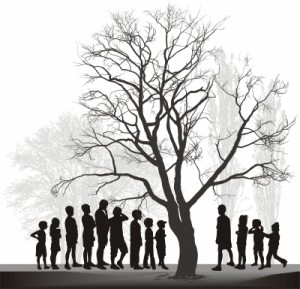We were watching a program last night about the Klu Klux Klan in North Carolina in the 1960s. It amazed me how easily it seemed that so many ‘good’ ‘God-fearing’ people were persuaded to join. But then the program went into a bit more detail about how recruitment was undertaken, and it all seemed to make a lot more sense.
First of all, the KKK provided entertainment at huge rallies, which brought mostly poor people from small towns all around. After the entertainment, the speeches voiced what a lot of the people were fearing – that the integration and elevation of negroes within their communities would have negative impacts on their community and on them personally. They were reminded that it was ‘us against them’ and the KKK would be available to represent their interests politically.
The KKK had no difficulty persuading people to not only join their group, but also to donate money to their cause.
Secondly, the rituals involved in the initiation process felt to the new members like such a spiritual experience, they became devoted followers.
The popularity of the group only began to fade after it was discovered that its leader had been pocketing some of the group’s funds.
The story about the KKK had been of great interest to me, after I had seen a comment on facebook, which had suggested that thinking that all Muslims are like ISIS is no different than thinking that all Christians are like the KKK.
I realised that this was true, and I started wondering about what there is in the psyche of humans which causes us to distrust people who are not like us. For without this distrust, the KKK would not have found an audience.
Without this distrust, we would not fear all Muslims just because they are different to us.
But then I remembered that we always seem to find someone to be the ‘them’ who are against ‘us’.
When the Greeks and Italian immigrants came to Australia in the 50s and 60s, they were wogs, not part of ‘us’. After they were integrated into the community, we made the Vietnamese refugees ‘them’. Now it seems that the Vietnamese have become part of ‘us’ as well, so we have had to find another ‘them’ to fear. Have we chosen Muslims to be the next ‘them’?
As I was pondering all this, I was reminded of a psychology experiment I learned about, during which, 12 year old boys were divided into two groups at a summer camp. The two groups became antagonistic towards each other, until they were brought together to tackle problems which affected both groups.
It seems that this is our normal response whenever we experience ourselves as part of a group, and see that there are others who don’t belong. I have seen this antagonism to outsiders displayed by groups that I have belonged to – eg. vegans to meat-eaters.
It has been this same response which has divided Catholics and Protestants, blacks and whites, communists and capitalists, Christians and Muslims.
The solution to this problem can be found within the same experiment.
We must endeavour to come together with the outsiders to tackle problems which affect both groups. In relation to Christians versus Muslims, ISIS is a problem which affects both groups. As another facebook post reminded me, lots of Muslims have been killed by ISIS too.
Another problem that unites us all is climate change. This situation affects everyone on the planet and we all need to work together to help minimise our impact.
Yet, we don’t need to have common problems in order to come together. We just need to see that there really is no division between us. Every person on the planet has similar needs: food, water, shelter and love. Every person is always doing the best that they can in the circumstances in which they find themselves.
Every person on the planet is just like us. There is no ‘them’.
Whenever we start to see others as ‘them’, we just need to remember the similarities which unite us and not focus on the differences.
Although every person on the planet has similar needs, every person is unique. If you try to, you can find a ‘them’ even within your own family. Why not celebrate each person’s uniqueness, whilst also embracing each other as part of the whole human family. Once we begin to embrace the rest of our human family as part of ‘us’, we can start to understand that we are one with all of God’s creation.
http://www.age-of-the-sage.org/psychology/social/sherif_robbers_cave_experiment.html
Image courtesy of Vlado at FreeDigitalPhotos.net


Leave A Comment